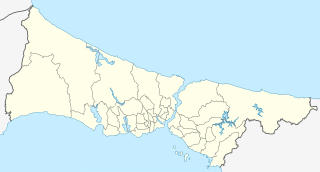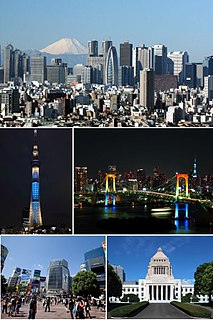
Yoshitarō Nomura was a prolific Japanese film director, film producer, and screenwriter. His first accredited film, Pigeon, was released in 1953; his last, Kikenna Onna-tachi, in 1985. He has received several awards during his career, including the Japanese Academy Award for "Best Director" for his 1978 film The Demon.
MotoichiKumagai was a Japanese photographer and illustrator of books for children, known for his portrayal of rural and school life.
Katsuji Fukuda was a Japanese photographer known for his photographs of still lifes and nudes, and also a writer of practical books about photography.
Karen Miyama is a Japanese actress. She used to be part of the Gekidan Tohai talent agency, and is now part of Horipro talent agency. She portrayed the young Ann Uekusa in the live-action drama Sand Chronicles. In anime, she provided the voice of title character Momo Miyaura in the 2011 film A Letter to Momo, and she provides the voice of main character Ichika Usami a.k.a. Cure Whip in Kirakira PreCure a la Mode.

Shirō Toyoda was a Japanese film director.
The Japanese Film Festival is a film festival held in Singapore and dedicated to Japanese cinema. It was held annually from 1999 to 2016, and curated with Singapore audiences in mind, led by local programmers with a wide ranging programme of film classics, Japanese independents and commercial releases. There was no festival in 2017. Under new direction from 2018 from the Japan Foundation in Tokyo, it has shifted its focus to screening mainly commercial releases from Japan.
Haru Asada was the Japanese concubine of Dr. Sun Yat-sen, the founder of the Republic of China.

Kasumi Arimura is a Japanese actress. She is known for playing the young Haruko Amano in Amachan (2013), and the lead role in Strobe Edge (2015) and Flying Colors (2015).
Satoshi Fujita is a Japanese horticulturalist and professor of the Human Environmental Science Department at Keisen University. He appears as a gardening tipster on the NHK TV show Shumi no Engei, which entered its 5th season in 2012.
Teiichi Okano was a Japanese composer.

Japanese School of Beijing (JSB) is a Japanese education day school in Chaoyang District, Beijing. The students are children of diplomats, businesspeople, and workers in foreign institutions.
Takeshi Miura was a Japanese actor.

Istanbul Japanese School is a Japanese international school located in Etiler, Beşiktaş, Istanbul, Turkey.

The Shanghai Japanese School (SJS) is a Japanese international school serving primary and junior high school levels in Shanghai. It has two campuses, one in Hongqiao and one in Pudong. The school's teachers are Japanese citizens. The school also has a senior high school component.

Taichung Japanese School is a Japanese international school in Daya District, Taichung, Taiwan in the Republic of China.
Lady Saso lived in Jinhan confederacy. She was also known as Sacred Mother of Mt. Seondo (Hangul:선도산) and she was from Chinese royal family. She came from China to Jinhan confederacy and gave birth to Hyeokgeose of Silla and his wife Lady Aryeong. There are specific descriptions in Samgungnyusa and Samguk Sagi.
Tetsuya is a Japanese dancer and actor. He is a member of Exile, Exile The Second and Dance Earth Party. He is also a member of the former Nidaime J Soul Brothers.
Hitogitsune or ninko (人狐) is a type of spirit possession told about in legends of the Chūgoku region of western Japan.

In the law enforcement system in Japan, Prefectural police departments are responsible for the regular police affairs as to the areas of the respective prefectures. Although these Prefectural police departments are in principle regarded as municipal police, in fact, in many parts they are under the central control of the National Police Agency.

Tano Jōdai (上代たの) was a professor of English literature, peace activist, and the sixth president of the Japan Women's University.











